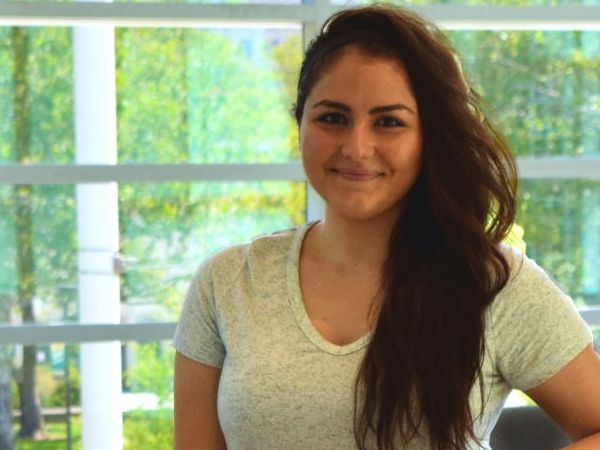Over the coming months, look for videos, stories and events that feature some of the many Wayne State initiatives and passionate individuals committed to eradicating health disparities. This content is part of WSU's Warriors in Action campaign highlighting how Wayne State is making a difference.
 After her 11-year-old brother was diagnosed with Wilms tumor, a type of kidney cancer, Athraa Hannawa, 22, decided to use her passion for sociology to understand why certain populations are more likely to get cancer.
After her 11-year-old brother was diagnosed with Wilms tumor, a type of kidney cancer, Athraa Hannawa, 22, decided to use her passion for sociology to understand why certain populations are more likely to get cancer.
“We already know how cancer forms. I want to figure out why. There are so many theories out there — even one that says it’s just bad luck that you develop cancer, like you hit the cancer lottery.”
Hannawa started college as a biology major, but quickly realized it wasn’t the right fit for her when she found herself bored of the material.
“I liked the concepts, but I hated the memorization. Sociology was always in the back of my mind. I loved all of the theories in it. Plus, you can use sociology in so many things, especially medicine and health.”
Hannawa soon learned that she enjoyed the research aspect of sociology and decided to dedicate her time to figuring out why the veteran population is being diagnosed with cancer at a higher rate than most.
“These are young, healthy people choosing to give their lives for us, then they come home and get diagnosed with cancer. I wanted to know why.”
According to Hannawa, a lot of veterans return from military service with symptoms of post-traumatic stress disorder and use negative coping mechanisms such as drug or alcohol abuse to ease them. Her research focuses on finding links between this substance abuse and the development of cancer.
“This research hasn’t been done before, and I’m so happy to have this opportunity. Hopefully I can get it funded so I can grow it even further.”
Hannawa devotes a lot of time to her research. And while it isn’t easy, she enjoys the work.
“It’s a lot of work, but it’s fun work. My friends see me reading research journals and studies and they think I’m crazy, but to me it’s fun.”
A bachelor’s in sociology is only a steppingstone for Hannawa, who hopes to become a doctor of osteopathic medicine, taking a more holistic approach to treating patients.
“I have an alternative view on medicine. Yes, sometimes it’s needed, but we didn’t always have modern medicine. Before that, we used plants and herbs. There are other ways to treat the human body.”
Hannawa views her degree in sociology as a great foundation for her future in medicine, allowing her to understand different perspectives and develop new and innovative ideas.
“We will always need sociology. There will always be different ways people think. Without sociology, I wouldn’t have thought of this theory about veterans. These different ideas force you to think, not memorize. That’s why I love sociology; it pushes me to think differently.”
By Carly Adams, College of Liberal Arts and Sciences communications associate
